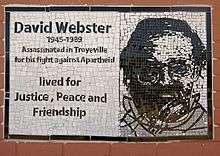David Webster (anthropologist)
- Not to be confused with the anthropologist David Webster of Penn State University, or the social historian David Webster of the University of Toronto
| David Joseph Webster | |
|---|---|
 Mosaic, David Webster Park | |
| Born |
1 Dec 1944 Northern Rhodesia |
| Died |
May 1, 1989 (aged 44) Troyeville, Johannesburg Murder (assassination) |
| Resting place | West Park cemetery, Johannesburg |
| Nationality | South African |
| Fields | Social anthropologist |
| Institutions |
Rhodes University University of the Witwatersrand |
| Alma mater | University of the Witwatersrand |
Dr David Webster (12 December 1944 – 1 May 1989) was an academic and anti-apartheid activist. He worked as an anthropologist at the University of the Witwatersrand, where he was a senior lecturer at the time of his assassination.
Webster was a founder member of the Detainees' Parents' Support Committee (DPSC) in 1981, a founder member of the Five Freedoms Forum, and a committed comrade in the United Democratic Front. Webster was also an active member of the Orlando Pirates supporters' club and he assisted in the mobilisation and organisation of South African musicians during the Struggle in the 1980s.
He was a long-term ethnographic researcher and his work near Kosi Bay on the Mozambican border resulted in a number of peer-reviewed academic publications.
Webster was assassinated by apartheid security forces outside his home on 1 May 1989.
Early years
David Joseph Webster was born in 1945 in Northern Rhodesia, where his father worked as a miner in the Copperbelt. He studied at Rhodes University in Grahamstown, where he was involved in student politics.[1]
In 1970, Webster started teaching anthropology at the University of the Witwatersrand. His doctorate had been written on a traditional topic of anthropology (kinship), but it was focused on a politically explosive field, namely migrant workers from Mozambique. In 1976, he was invited to teach for two years at the University of Manchester in the UK.
Webster was active in the political anti-apartheid movement, especially in the 1980s for the Detainees' Parents' Support Committee, an organisation advocating the release of political detainees held without trial in South Africa.[1]
Assassination
Webster was shot dead outside his house at 13 Eleanor Street in Troyeville, Johannesburg, by assassins in the employ of the Civil Cooperation Bureau, a clandestine agency of the apartheid state.[2] The hit squad was paid R40,000 (at the time, equivalent to about US$8,000) for his murder. Ferdi Barnard, the man who pulled the trigger on the shotgun used, was later tried and found guilty in 1998; he was sentenced to two life terms plus 63 years for a number of crimes, including the murder of Webster.[3]
Thousands of people attended his funeral service at St Mary's Cathedral, Johannesburg.
Personal life
Dr Webster was an active member of the Orlando Pirates supporters' club. Members of the supporters' club formed a guard of honour around his coffin at his funeral.
Legacy
The house in Troyeville where Webster lived with his partner Maggie Friedman has been declared a heritage site. On the site of his assassination outside David Webster House there is a mosaic that includes the words "Assassinated here for his fight against apartheid. Lived for justice, peace and friendship".[4] A nearby park in Clarence Street (previously called Bloemenhof Park) was renamed the David Webster Park on the 20th anniversary of his death.[1] There is also a mosaic in the park by Jacob Ramaboya from the Spaza Gallery which commemorates his life.
In 1992, the University of the Witwatersrand named a new Hall of Residence Webster's honour. The David Webster Hall of Residence is now home to 217 Wits University students.
References
- 1 2 3 "David Joseph Webster". sahistory.org.za. Retrieved 23 July 2013.
- ↑ "The night Ferdi Barnard told me he killed", Nov 21 1997, Mail & Guardian
- ↑ "Ferdi Barnard is found guilty of killing Webster", sahistory.org.za
- ↑ "Webster's house now a heritage site". The Star. 23 July 2012. Retrieved 20 July 2013.
External links
- Short Biography
- Archival 'news' item with photograph of David Webster as used on posters used at his funeral
- Article in Grassroots vol. 10, no.2, May 1989, "Why did they kill David Webster", including photos of David Webster, of mourners at the funeral, and outside St Mary's Cathedral in Johannesburg
- Tribute by Lloyd Vogelman
- Tribute by Edward (Eddie) Webster, a colleague at 'Wits', published in Transformation, volume 9
- Newspaper page with pictures of the scene of the assassination, as well as a photo of David Webster writing field notes
Literature
- Webster, D & Hammond-Took, W D (eds) 1975. Agnates and affines: studies in African marriage, manners and land allocation. Johannesburg: Witwatersrand University Press. (=African Studies 34 (4))
- Webster, D 1984. The reproduction of labour power and the struggle for survival in Soweto. (Carnegie Conference paper no.20) Rondebosch: Southern Africa Labour and Development Research Unit. ISBN 0-7992-0694-6.
- Webster, D & Friedman, M 1989. Repression and the State of Emergency, June 1987-March 1989. Johannesburg: Ravan Press. (Published posthumously)
- Webster, D 1991. Abafazi Bathonga Bafihlakala: Ethnicity and Gender in a KwaZulu Border Community. African Studies 50 (1-2) 243-271. (Published posthumously)
- Frederikse, J 1998. David Webster. Cape Town : Maskew Miller Longman. ISBN 0-636-02255-2.
- Stiff, P 2001. Warfare by Other Means: South Africa in the 1980s and 1990s. Alberton (South Africa): Galago. ISBN 1-919854-01-0.